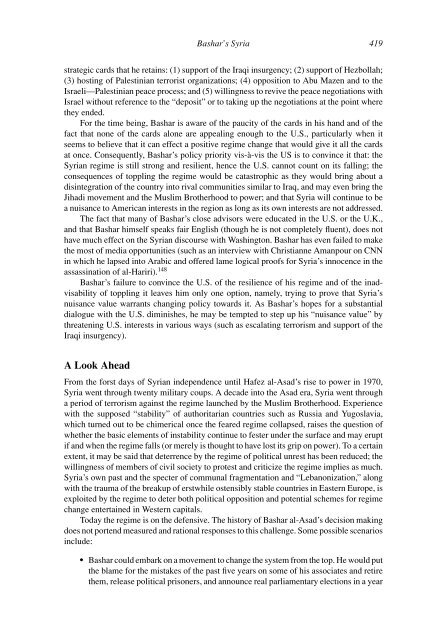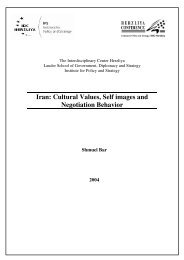Bashar's Syria: The Regime and its Strategic Worldview Shmuel Bar ...
Bashar's Syria: The Regime and its Strategic Worldview Shmuel Bar ...
Bashar's Syria: The Regime and its Strategic Worldview Shmuel Bar ...
Create successful ePaper yourself
Turn your PDF publications into a flip-book with our unique Google optimized e-Paper software.
Bashar’s <strong>Syria</strong> 419strategic cards that he retains: (1) support of the Iraqi insurgency; (2) support of Hezbollah;(3) hosting of Palestinian terrorist organizations; (4) opposition to Abu Mazen <strong>and</strong> to theIsraeli—Palestinian peace process; <strong>and</strong> (5) willingness to revive the peace negotiations withIsrael without reference to the “deposit” or to taking up the negotiations at the point wherethey ended.For the time being, Bashar is aware of the paucity of the cards in his h<strong>and</strong> <strong>and</strong> of thefact that none of the cards alone are appealing enough to the U.S., particularly when <strong>its</strong>eems to believe that it can effect a positive regime change that would give it all the cardsat once. Consequently, Bashar’s policy priority vis-à-vis the US is to convince it that: the<strong>Syria</strong>n regime is still strong <strong>and</strong> resilient, hence the U.S. cannot count on <strong>its</strong> falling; theconsequences of toppling the regime would be catastrophic as they would bring about adisintegration of the country into rival communities similar to Iraq, <strong>and</strong> may even bring theJihadi movement <strong>and</strong> the Muslim Brotherhood to power; <strong>and</strong> that <strong>Syria</strong> will continue to bea nuisance to American interests in the region as long as <strong>its</strong> own interests are not addressed.<strong>The</strong> fact that many of Bashar’s close advisors were educated in the U.S. or the U.K.,<strong>and</strong> that Bashar himself speaks fair English (though he is not completely fluent), does nothave much effect on the <strong>Syria</strong>n discourse with Washington. Bashar has even failed to makethe most of media opportunities (such as an interview with Christianne Amanpour on CNNin which he lapsed into Arabic <strong>and</strong> offered lame logical proofs for <strong>Syria</strong>’s innocence in theassassination of al-Hariri). 148Bashar’s failure to convince the U.S. of the resilience of his regime <strong>and</strong> of the inadvisabilityof toppling it leaves him only one option, namely, trying to prove that <strong>Syria</strong>’snuisance value warrants changing policy towards it. As Bashar’s hopes for a substantialdialogue with the U.S. diminishes, he may be tempted to step up his “nuisance value” bythreatening U.S. interests in various ways (such as escalating terrorism <strong>and</strong> support of theIraqi insurgency).A Look AheadFrom the forst days of <strong>Syria</strong>n independence until Hafez al-Asad’s rise to power in 1970,<strong>Syria</strong> went through twenty military coups. A decade into the Asad era, <strong>Syria</strong> went througha period of terrorism against the regime launched by the Muslim Brotherhood. Experiencewith the supposed “stability” of authoritarian countries such as Russia <strong>and</strong> Yugoslavia,which turned out to be chimerical once the feared regime collapsed, raises the question ofwhether the basic elements of instability continue to fester under the surface <strong>and</strong> may eruptif <strong>and</strong> when the regime falls (or merely is thought to have lost <strong>its</strong> grip on power). To a certainextent, it may be said that deterrence by the regime of political unrest has been reduced; thewillingness of members of civil society to protest <strong>and</strong> criticize the regime implies as much.<strong>Syria</strong>’s own past <strong>and</strong> the specter of communal fragmentation <strong>and</strong> “Lebanonization,” alongwith the trauma of the breakup of erstwhile ostensibly stable countries in Eastern Europe, isexploited by the regime to deter both political opposition <strong>and</strong> potential schemes for regimechange entertained in Western capitals.Today the regime is on the defensive. <strong>The</strong> history of Bashar al-Asad’s decision makingdoes not portend measured <strong>and</strong> rational responses to this challenge. Some possible scenariosinclude: Bashar could embark on a movement to change the system from the top. He would putthe blame for the mistakes of the past five years on some of his associates <strong>and</strong> retirethem, release political prisoners, <strong>and</strong> announce real parliamentary elections in a year
















